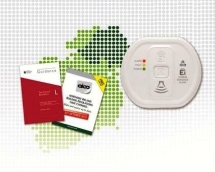17th December 2012

With the new Building Regulations (Northern Ireland) 2012 now in place, Aico is reminding contractors working in this region that it is now a requirement to fit a Carbon Monoxide (CO) alarm in the same room as any new or replacement ‘combustion appliance’ that they install. A combustion appliance is any piece of equipment that is designed to burn gas, oil or solid-fuel, that isn’t designed solely for cooking. The new Regulations, detailed in Technical Booklet L Combustion Appliances and Fuel Storage Systems, apply to all properties in Northern Ireland - new builds and existing dwellings.
Michael Wright, Product Manager for Aico, comments on these latest Building Regulations: “When CO alarms appeared in Building Regulations for England and Wales for the first time, it was seen as a long awaited recognition of the important role a CO alarm has to play in a domestic property. However, the Regulations only covered new or replacement fixed solid fuel appliances.
“Building Regulations for Northern Ireland have gone a step further, addressing all combustion appliances that aren’t used solely for cooking. It’s a major step forward.
“Guidance within the Building Regulations is also given for the type of CO alarm used and its siting, which is also extremely important.”
This guidance includes using a CO alarm that complies with BS EN 50291 and is powered by a battery designed to operate for the working life of the alarm. The alarm should incorporate a warning device to alert users when the working life of the alarm is due to pass. Mains-powered BS EN 50291 Type A CO alarms with fixed wiring (not plug-in types) may be used as alternative applications provided they are fitted with a sensor failure warning device.
Positioning the alarm in the right place is vital to ensure it works properly. If CO is emitted with warm exhaust fumes it rises to the ceiling, before mixing with air and spreading through the room. This is why CO alarms should be sited on the ceiling one to three metres horizontally from the appliance and at least 300mm away from a wall or any obstructions (e.g. light fittings). If it has to be wall mounted, it should be fitted as high as possible but not within 150mm of the ceiling. The alarm should be placed higher than door or window levels and away from anything that could affect the airflow to the alarm (such as extraction fans). It should also be away from any sources of moisture, such as a sink. If there is a partition or beam, always site the alarm on the side closest to the appliance and if the room has a sloping ceiling, site the alarm towards the highest area.
Aico has produced a handy information leaflet to guide you through the main points of the new regulations. It is available at selected wholesalers. For more information, Aico’s Plumbing and Heating Installers Handybook covers all you need to know about the dangers of CO and how to protect against it. The Handybook also gives information on Aico’s full CO alarm product range, including the new Ei208 tamper proof Lithium battery CO alarms and the company’s mains powered models, all featuring Aico’s proven CO sensor which is pre-calibrated and tested in CO gas to ensure accuracy.
Aico’s RadioLINK technology is also covered in detail. RadioLINK allows Aico CO and smoke alarms to be interconnected wirelessly (using Radio Frequency signals) for better alarm audibility without the installation time, costs and disruption associated with hard wired interconnection.
Aico is a wholly owned subsidiary of Ei Electronics. Aico alarms are designed and built in Europe specifically to meet the UK standards and regulations. For more information and to register for a copy of the Plumbing & Heating Installers Handybook please visit www.aico.co.uk.
 back to Trade News
back to Trade Newsfollow us |
© MIDA International Ltd 2011 |
Privacy Policy | Site by Adventure |
